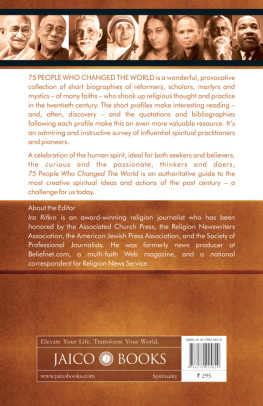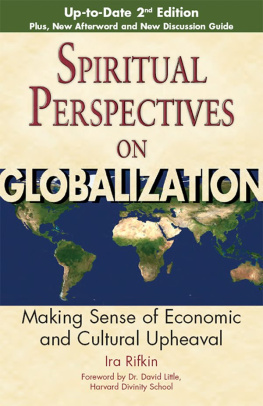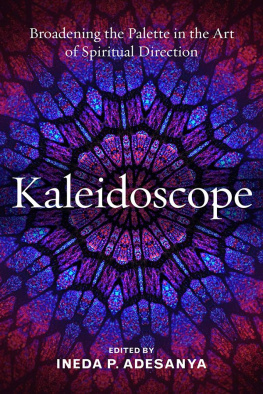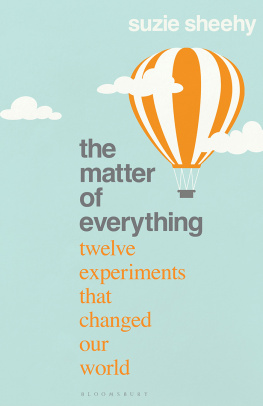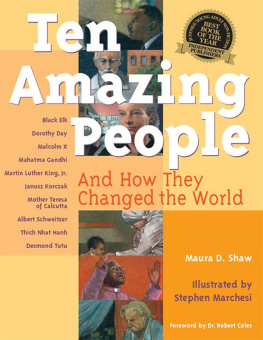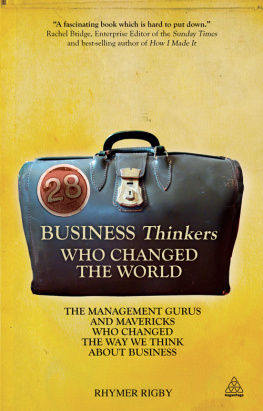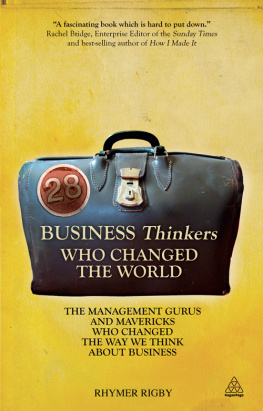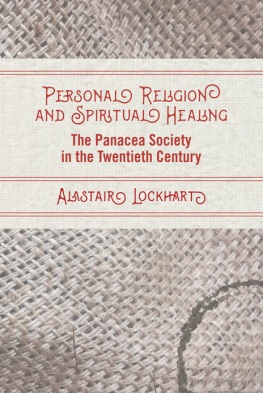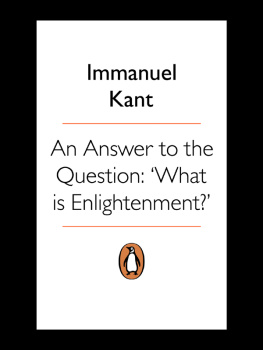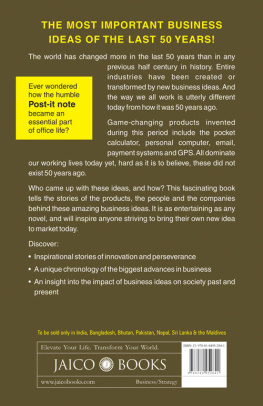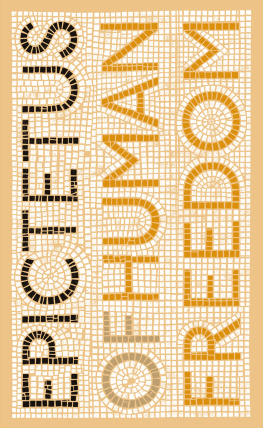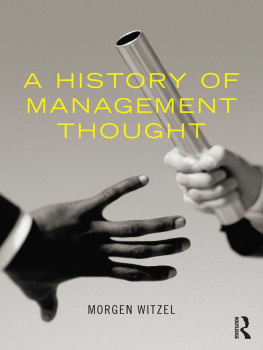
EDITED BY IRA RIFKIN
FOREWORD BY DR. ROBERT COLES
WINNER OF THE PULITZER PRIZE
JAICO PUBLISHING HOUSE
Ahmedabad Bangalore Bhopal Bhubaneswar Chennai
Delhi Hyderabad Kolkata Lucknow Mumbai
Published by Jaico Publishing House
A-2 Jash Chambers, 7-A Sir Phirozshah Mehta Road
Fort, Mumbai - 400 001
www.jaicobooks.com
Foreword Dr. Robert Coles
Text SkyLight Paths Publishing
Published in arrangement with
SkyLight Paths Publishing
Woodstock, Vermont, USA
www.skylightpaths.com
75 PEOPLE WHO CHANGED THE WORLD
ISBN 81-7992-582-X
First Jaico Impression: 2006
Eighth Jaico Impression: 2012
No part of this book may be reproduced or utilized in
any form or by any means, electronic or
mechanical including photocopying, recording or by any
information storage and retrieval system,
without permission in writing from the publishers.
by Dr. Robert Coles
A s I read the pages that follow I couldnt help but remember the remarks that theologian Paul Tillich offered those of us who were lucky then, in 1958, to be members of his seminara class meant to consider what this book has summoned for its readers. Spiritual energy is sometimes reduced rather than enhanced by formal religious observance, our Harvard professor told us, and there we were yet again, silently considering the import of spoken words, their ironic thrust not easily understood by most of us.
As if aware of our response and anxious to make himself as clear as possible, our professor repeated himself. He then went into an extended soliloquy of sorts, during which he reminded us that the prophets Jeremiah and Isaiah were insistently critical of the status quo, even as Jesus of Nazareth was restlessly original-minded, ready to take on various principalities and powers directly or by implication. By the time Tillich finished, we were all still eager to return to the safety of talk about books and about our interpretations of a particular reading assignment. But Tillich had one more comment, which would last and last in our thinking, and which came to my mind as I went through this book: The Bibles prophets were not theologiansthey were storytellers, determined to give us all much pause. He went on to contrast abstract analysis with the concrete narrative presentations of various storytellers, in whose direction he urged us to travel. I think of him today when I encounter them: Flannery OConnor, for instance, who urged on us, Where feeling for a story is absent, theory will not supply it. At another point she wryly observed, The task of the novelist is to deepen mystery, and mystery is a great embarrassment to the modern mind.
In a sense, this book offers dozens of extraordinary people who dared in their various ways to carry forth the kind of searching, unconventional spiritual explorations of mind, heart, and soul that Tillich favored, and OConnor as well. Those of us who meet the seventy-five individuals in these pages will be given a lucky chance to think of their respective messages, keep them very close to ourselves as we try to figure out lifes meaning and purposethe spiritual direction we aim to pursue and our reasons. Even as Tillich wanted us to keep in mind his thoughts (not to mention those of the great prophets of Israel he called upon), even as Flannery OConnor wanted to unnerve us a bit in her fiction and jolt us every now and then in her essays, these seventy-five spiritual innovators confront us with their words and deeds, their brave willingness to say and do what they believed to be both necessary and spiritually befitting. Here are individuals who affirmed in their daily lives what truly matters; thereby, they touch us, inspire us, stir us to take stock of this earthly existence given us. Collectively, a large gift, indeed, from them to so many, the readers of this book included.
A n adventurethats what developing Spiritual Innovators: Seventy-Five Extraordinary People Who Changed the World in the Past Century has been for us.
Two years ago, as the new century dawned, members of our editorial team in Vermont were musing about the incredible century of religion that had just passed. We discussed the unprecedented exposure of East to West that has happened in the past century, the steps taken toward equalizing roles available to women and minorities, the armed conflicts that have been inspired by religious hatred and misunderstanding, the growth of pluralismnot just toleranceas a concept, and the refreshing cross-pollination that has happened across spiritual and religious traditions.
Our conversation eventually turned to people. People. Who, we asked each other, were the most extraordinary spiritual and religious people of the past century?
One of us mentioned the remarkable spiritual leaders we have seen (for instance, Maha Ghosananda, Martin Luther King, Jr., and Daniel Berrigan). Another said that the spiritual leader as celebrity was a twentieth-century phenomenon (such as H. H. the Dalai Lama, Mother Teresa, and Billy Graham).
We left the room that afternoon with a mission. We would canvas the worlds spiritual and religious leaders, as well as experts in leading universities and seminaries, asking: Draw up your list of the ten most important spiritual/religious innovators of the twentieth century. Tell us those people who, in your opinion, brought the most change, excitement, innovation, creativity, and vitality to the religious and spiritual lives of people throughout the world.
We asked representatives of nearly every religious tradition and spiritual persuasion. We tallied their results, added a few of our own opinions and our analysis, and drew up the final list of seventy-five.
You will no doubt find someone dear to you and your spiritual life missing. We apologize for that. If we had room, we no doubt would have included, for instance, Jean Vanier, John A. T. Robinson, Krister Stendahl, Bernie Glassman, John Shelby Spong, Joan Halifax, M. Basil Pennington, Louise Hay, Karl Rahner, William Sloane Coffin, Alan Watts, Gershom Scholem, and many many others.
We commissioned religion journalists, authors, book editors, and other experts to write each of the seventy-five profiles of these extraordinary people. Ira Rifkin, award-winning religion journalist, brought them all together into a book.
Chgyam Trungpa, Pope John XXIII, Aimee Semple McPherson, and D. T. Suzuki ranked numbers 25 in our survey. Our greatest surprise in the process? The top vote-getter was none other than Dr. Bob, the cofounder of Alcoholics Anonymous. AA may just be the most important spiritual organization founded in the past century.
JON M. SWEENEY
Editor in Chief
M y sincerest thanks to the talented writers who crafted the profiles contained in this book. Their names are listed elsewhere, but their work is this books core. Thank you as well to SkyLight Paths, particularly Stuart, Jon, Emily, and Maura.
Most of all, I wish to thank my personal guides: my wife, Ruth, and sons, Brady and Jesse.
I. R.
by Ira Rifkin
O n a blustery Sunday evening in November 1997, the Orthodox Christian Ecumenical Patriarch Bartholomew I came to Johnstown, Pennsylvania, and the faithful, more than a thousand of them, packed Christ the Saviour Cathedral for this once-in-a-lifetime religious experience. Among them was a local family with a severely disabled son. The youth, his body contorted by cerebral palsy, appeared to be a teenager but at twenty was really more a young man. He sat in a wheelchair, his body jerking uncontrollably. Saliva dripped down his jaw, and family members took turns wiping it away. As did everybody, the family stayed in place for hours in advance of the late-arriving patriarch, who was wrapping up a long tour across the United States.
Next page
